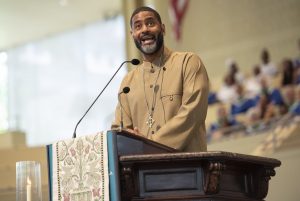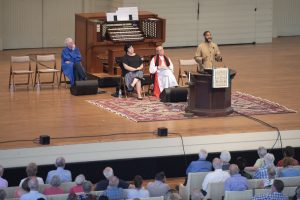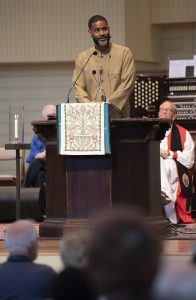
“Neighbor , oh neighbor, I know this is a challenging text, but this is us,” the Rev. Otis Moss III said at the 9:15 a.m. Tuesday Ecumenical Service. His sermon title was “This Is Us, Part 2,” and the Scripture text was 2 Samuel 13:1-21, the rape of Tamar.
Moss retold the story of Tamar using his “sanctified imagination,” the New International Version of the Bible and the OM3 (Otis Moss III) version. Amnon, a half brother of Tamar, was obsessed with her. “He made himself ill, he was so obsessed with her,” Moss said.
Amnon had a cousin, Jonadab, who was his adviser, and when Jonadab learned why Amnon was looking so haggard, he advised Amnon to pretend to be sick and ask King David to send Tamar to cook for Amnon. Tamar made bread for Amnon, and then he sent everyone out of the room. He grabbed Tamar and forced her into bed with him. Tamar begged, “Don’t do this wicked thing. Where would I go? And you would be a wicked fool.” Amnon violated her and then hated her.
“He told her to get up and get out,” Moss said.
Tamar told Amnon that sending her away would be a greater wrong than what he had already done, but Amnon had a servant put her out and bolt the door.
“She had been wearing the beautiful robes of a virgin princess,” Moss said. “She tore the robe and put on sackcloth and ashes. When she got home, her brother Absalom asked, ‘Has he been with you?’ ”
When she said “yes,” Absalom was furious, but he told her not to talk about it. Absalom went to King David, enraged.
“Absalom hated Amnon but did nothing,” Moss said. “King David was furious, but he did nothing. He did not speak up for his own daughter. Somehow we do a poor job of addressing the messy truth of life. The Enemy, as the Pentacostal church says, seeks to silence your voice, and you have to gather with others to have the power to speak.”
The MeToo Movement, founded in 2006 by Tarana J. Burke, has raised awareness of the pervasiveness of assault and sexual abuse in society. It became hashtag #MeToo when actress Alyssa Milano tweeted it in light of the Harvey Weinstein sexual abuse allegations.
“Tarana Burke founded MeToo after hearing the cries of people who had been assaulted and abused; it went viral when a famous woman, who was white, used it,“ Moss said. “We don’t want to talk about sexual assault and abuse. It is an open secret in our communities; we have failed to speak with power about violations in the community.”
Being silent will not make the issue go away.

“People need to hear a word from the pulpit so they will be lifted up and find God’s compassion. Many people are on the edge of freedom, but they are shackled by shame,” Moss said.
Tamar had known injury in her own home, and the pulpits of the church, Moss said, “have been used as lecterns of injury.”
“I want to say today that collectively, we are sorry,” he said. “We are sorry, Tamar, that you were not allowed to tell your story; you were denied the opportunity to confront human misbehavior and feel divine action. We are sorry, Tamar, that we sent you back to your abuser. We are sorry, Tamar, that we did not call the shelter. This is our collective failure, whether you are part of a denomination, an atheist, a humanist, a none. If we are human we must confront the horrors of humanity.”
This Biblical story begins with the depravity of Amnon, but he had an enabler — his cousin Jonadab.
“Amnon found a cousin to collude with him to violate his sister,” Moss said. “There is usually collusion by people on the payroll, deacons, the pulpit, the board and in spaces of power, like a white house in D.C.”
Collusion is pathetic, Moss said.
“Tamar was stalked by two men who were supposed to protect her,” he said. “God wants you to hear this — it was not your fault, Tamar. It was not your ornate robe. If you never hear it again, hear it now — it was not your fault, Tamar.”
Moss said he has “issues with (King) David,” as well.

“(David was) a father who would protect Israel but not his own family,” he said. “You were a public success but a private failure. You were a great leader but a bad father. Amnon was following your lead. You were a violator of Bathsheba. My wife, Monica, says that children are great observers but terrible interpreters. Amnon thought that this is what it means to be a man. David, I have issues with you.”
Tamar was not without agency. Absalom told her not to say anything, to keep her voice down, to keep the story off the front page.
“Tamar rips her robe that indicated her royal status and put on sackcloth and ashes,” Moss said. “It was a sign that something horrendous had happened, and in my sanctified imagination, I hear all the women in the palace whispering about what happened and then all the women in Israel went around in sackcloth and ashes, an early MeToo Movement.”
Moss told the congregation, “Just because you are in power, it does not mean you have moral principles. Just because you are in power, it does not mean you have a moral compass. There is a man in power who has no moral compass and no principles — and his name is David.”
By tearing her robe, Tamar was saying, “I am valuable, I am still here and I will not be silent.”
“Are we willing to stand with those who wear sackcloth and ashes, or are we going to ask them if it actually happened and ask them to testify before men about what happened?” Moss asked.
Someone can shift from sackcloth and ashes, Moss said, when they are “attuned to how God is moving.” Moss’ beloved sister, Daphne, suffered from paranoid schizophrenia. She came home from Spelman College one summer and was deeply depressed most of the season. Just as she was about to go back to Spelman, her mood lifted. Moss asked her what happened. Daphne told him she had been listening to some old disco music on the radio, and she heard lyrics that moved her spirit. The song was “I Will Survive,” sung by Gloria Gaynor. Moss quoted a few lines from the song: “Did you think I’d crumble? Did you think I’d lay down and die? / Oh no, not I, I will survive / Oh, as long as I know how to love, I know I’ll stay alive / I’ve got all my life to live, and I’ve got all my love to give / And I’ll survive, I will survive.”
“We must speak with authority to those we know are survivors,” Moss said. “They will survive and thrive when they are around people who lift them up. I apologize again if you have been injured by the pulpit. We have much to learn from you of God’s power and grace. You will survive; I will survive.”
Moss asked anyone in the congregation who was a survivor or knew someone who was a survivor to stand.
“You are a survivor,” he said.
Then he invited the whole congregation to stand and join hands.




